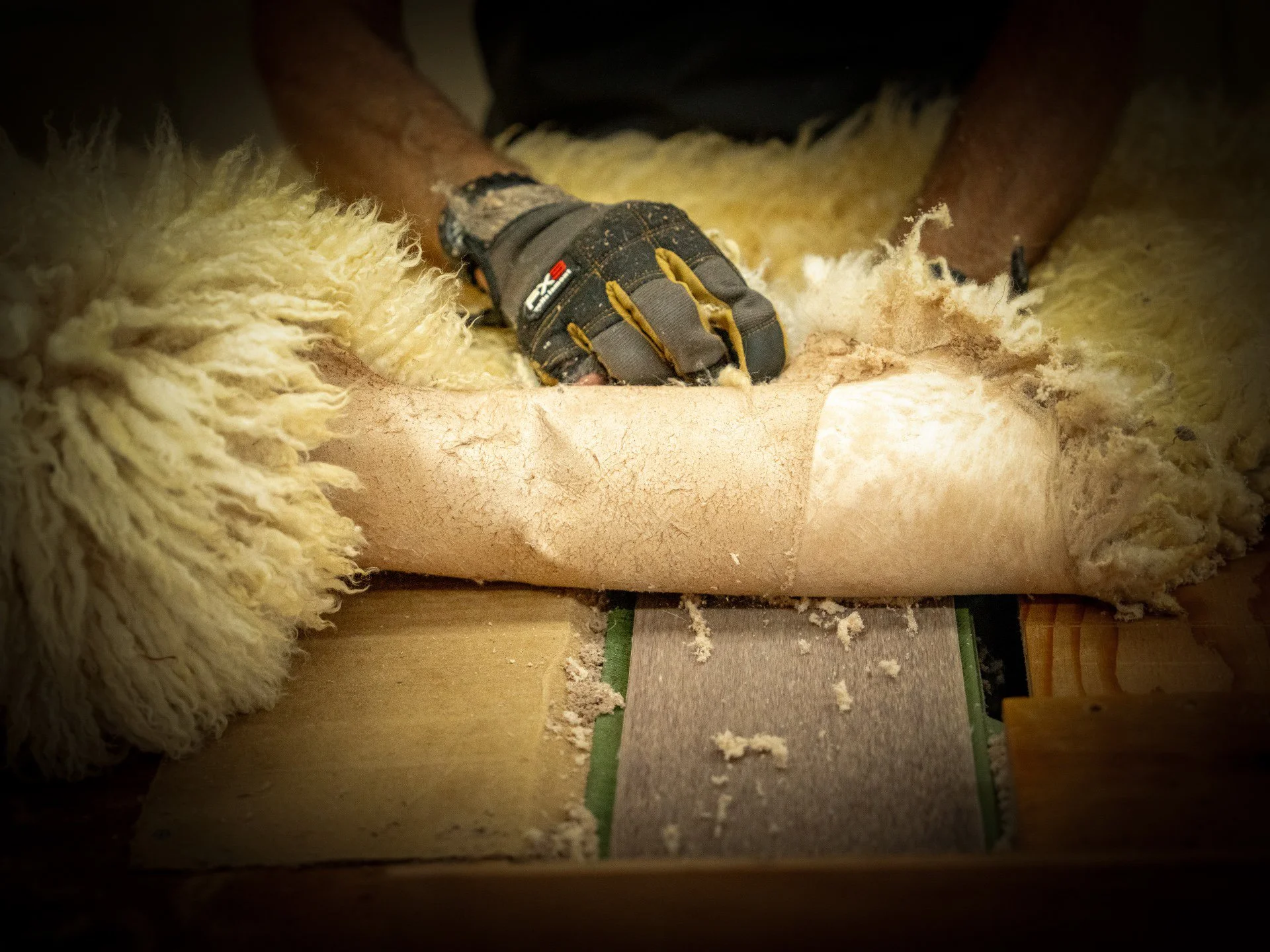<<< Currently accepting sheep (wool & hair), goat, deer>>>
***No longer accepting elk for the 2025/2026 season***
Sorry, we do not accept cattle hides
PHOTO BY JUSTIN TAYLOR
Mimosa bark* tanning services
Sheep and Goat
Extra Small (24 inches or less in length) $45
Small (36 inches or less in length) $115
Medium (48 inches or less in length) $135
Large (over 48 inches in length) $150
Extra Large Pricing varies
Deer, goat, sheep leather** $110
Deer hair-on $130
Elk Leather (no longer accepting for the 2025/26 season) $15/square foot
Elk (no longer accepting for the 2025/26 season) $25/square foot
Additional charges will be added to your invoice for the following services.
Fleshing Service $30 per hide (sheep, goat, deer)
Fleshing Service Elk $150 per hide
Fiber 6” or longer $30 per hide
Excess Vegetation $30 per hide
Burr Removal $50 per hide
Greasy Hide or Excess Fat $30 per hide
*Bark tannage may alter the color of wool fiber slightly and the leather will be a light salmon color.
**Leather will be taken to the crust stage so that the end user can dye and finish as they see fit.
Hide Preparation:
Hides must be salted and cured per instructions before the tannery can accept delivery of them. See Hide Preparation form
Drop off hours: You may drop off your hides to us at our workshop at 109 River Street, Argyle, Wisconsin Monday through Fridays from 8:00 am to 4:00 pm, or by appointment. If you are traveling a distance, it is best to let us know you are coming as occasionally our hours change. Our email is driftlesstannery@gmail.com
Shipping Instructions:
Fold your hide in half, skin side in (fiber side out), front limb to front limb, back limb to back limb. Fold in half again and place into a cardboard box for shipping.
Fill out our Shipping Intake Form and put it in the box with your hides.
If you are tax exempt, please fill out this Tax Exemption Form and send it in with your hides.
Ship to: Driftless Tannery, 109 River Street, Argyle Wisconsin 53504.
Charges:
Customers will be charged a $30 deposit, per hide upon arrival. The remaining balance will be charged upon completion of our services.
Hides can either be picked up in Argyle between 8:00 am and 4:00 pm Monday through Friday, or they will be shipped back to the owner at their cost.
Completed hides will need to be picked up within 10 business days of notification of completion. After that a $20 per day holding fee will be charged.
-
Our natural process requires our farmers to partner with us in this very first step.
Chances are your butcher will not return the hides to you in the condition we need them to be in. You must remove flesh and fat to less than 1/8 of an inch thickness.
The cleaner the fleshing the better the tan.
Too much fat and meat will prevent the hide from properly curing and could lead to hair slippage. The fat and meat will cure under the salt, the hide will not.
This affects our process in the following ways:
Physical strain: During the washing process, the fat will start to dissolve in the wash water and it will take us longer to get the fiber clean. The hides are heavier causing more personal strain on staff when we are moving them through the process.
Waste: The fat and meat will make our pickles dirty increasing the frequency in which we need to replace them. This is not only wasteful, the extra materials cost us money. The extra fat/meat needs to be disposed of.
Finished product: When the hide is improperly cured, the tan will not react to the fibers as it should.
-
We appreciate that these animals live on the land and need to eat hay. We accept that ⅛ of the hide will likely have some amount of vegetation to contend with. Anything beyond ⅛ of the hide will incur charges.
Extra vegetation affects our process in the following ways:
Physical strain: During the washing process we have to work hard to brush and rinse out the vegetation as it tends to bind the dirt and grime in the fibers. Much of the vegetation will not come out during our wash process and will need to be brushed out in the final stages of our finishing process. This is done primarily by hand. The repetitive stress of brushing these hides causes undue strain on our staff.
Finished product: As much as we brush and brush (see above: physical strain), oftentimes we are unable to get all the vegetation out creating a less than ideal finished product.
-
We understand how difficult it is to manage burdock in pasture once it becomes established.
We accept hides with less than 6 burrs in them. We will charge for anything more. Any hide with above 15 burrs, we will not accept.
Burdock affects our process in the following ways:
Improperly cured hides: Hides with an excessive amount of burdock bunch fibers together trapping moisture near the hide. This often results in hair slippage underneath the burr because bacteria was able to colonize and destroy the hair follicle during the curing process.
Physical strain: During the washing process we have to remove each burr by hand and then brush and rinse out the spurs left behind. Many of the spurs will not come out during our wash process and will need to be brushed out in the final stages of our finishing process. This is done primarily by hand. The repetitive stress of brushing these hides causes undue strain on our staff.
Finished product: As much as we brush and brush (see above: physical strain), oftentimes we are unable to get all the spurs out creating a less than ideal finished product.
-
There are two main causes for greasy leather: improper cure and an older, fatty sheep. The former can be avoided, the latter cannot and may not become evident until the last stage of our process.
We have had some luck using cornstarch on these greasy hides. The cornstarch draws the fat up and we are able to then scrape it off. We have to repeat this process several times. This process can take hours, and the results are not as complete as we would like them to be. Oftentimes the grease eventually comes through the leather once again. It is near impossible to remove it completely.
That said, we have decided instead of absorbing the cost in man hours, we need to pass that along to the customer. We will be charging an additional $30 for the service. If you send a hide to us that turns out to be greasy, we will contact you before moving forward. We don’t want to pass on unwanted charges unless the client wants us to try our post tanning, degreasing method.
Disclosures:
Please take note of how the following aspects are impacted by our process.
-
This is where we need you to work with your local butcher.
Please educate them about the importance of these hides. Let them know they have value.
When we receive hides with too many butcher holes it affects our process in the following ways:
Time: Hides can tear during the washing process causing extra time and attention to be paid to each hide. It takes us more time to remove membranes when we have to work around holes as the hides tend to tear around the holes. Additionally, our finishing process is held up by having to use caution around holes when we buff them.
Finished product: Hides with an excessive amount of butcher holes create a less than ideal finished product as we have to trim off more than we would normally and the hide may end up with a bit of a funky shape.
-
Certain breeds of sheep are more difficult to clean in our process which is void of harsh chemical detergents and degreasers.
Breeds such as Merino, CVM, or Rambouillet and other super fine wool breeds often have a very high lanolin content.
This causes the dirt and grime to really hold on to the fibers.
If these hides come in full of grassy vegetation, it is impossible to get it completely cleaned out of the fiber and the result will be a less than perfect hide.
We will do all we can on our end to care for and preserve your hide,
but all tanning work is done at the owner's own risk as the process begins during the curing stage.

